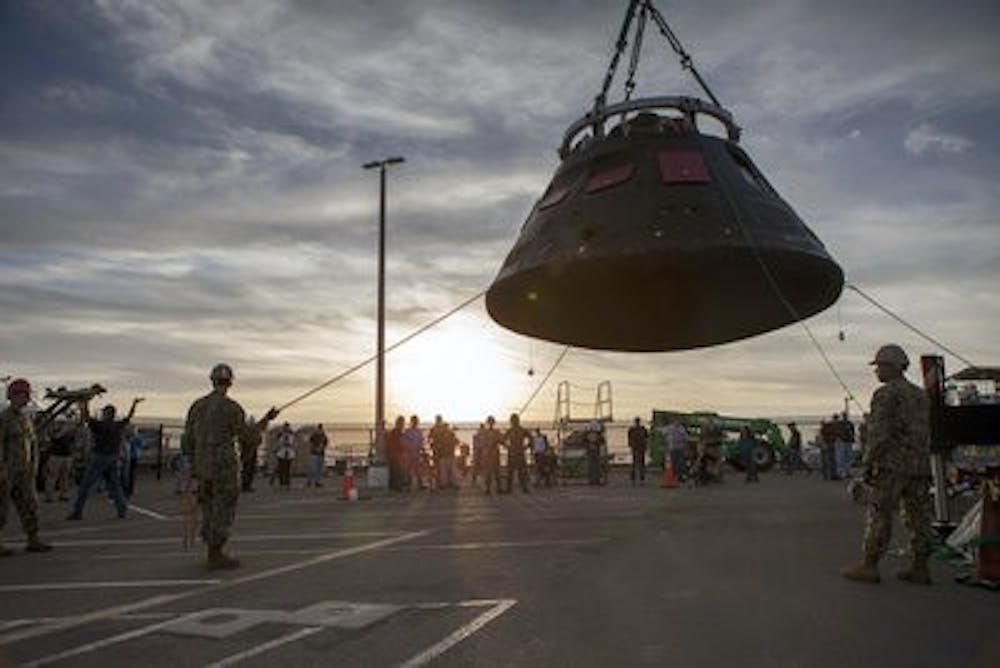The Orion space capsule blasted into orbit atop a Delta IV heavy rocket from Cape Canaveral, Florida on Dec. 5, 2014.
NASA and Lockheed Martin engineers collected data for testing during its four-hour flight, according to NASA's website.
Jeff Hampton, systems engineer for Lockheed Martin and Auburn alumnus, said the flight tested how the capsule would perform at 85 percent of its potential speed when reentering Earth's atmosphere.
Orion flew 3,600 miles into space, farther than any craft capable of carrying humans has flown in more than 40 years.
"Our heat shield's got to meet that criteria to survive reentry at that speed," Hampton said.
Hampton said he helped the Orion teams work together.
"One of my main tasks is to make sure the hardware guys are talking to the software guys, and the software guys are talking to the hardware guys, and everyone's talking to the lab guys," Hampton said.
Hampton said he also did a compatibility analysis for Orion's software to ensure the ship's computers could handle the data it collected.
For his work on Orion, Hampton received a program manager's commendation and a Silver Snoopy.
Beth Schulze, software team lead at Lockheed, said the Silver Snoopy is a prestigious NASA award that is "not easy to get."
Schulze said she helps direct Hampton's team in Houston from her office in Denver. She said Hampton is a talented worker and "very brilliant" even by the standards of rocket scientists.
"We consider Jeff to be one of our big-brain kind of guys," Schulze said. "He understands a lot. He's good at putting together small parts into the big picture ... It's not always easy to find people who can do that."
Hampton graduated from Auburn University in 1990 magna cum laude with a bachelor's degree in computer science.
He originally attended McNeese State University for a year and a half where he "burned out" before dropping out and moving to Alabama.
He lived there for a year to establish residency and applied to Auburn.
Hampton finished his undergraduate degree at Auburn and graduate studies at the University of Colorado at Boulder.
As a student he worked at Auburn's veterinary school and co-oped to support himself.
"It was persistence that got me through," Hampton said.
After graduation, he tried to fulfill a lifelong dream of working at NASA, even getting an interview. He did not get the job, instead signing on at Lockheed Martin.
In 2008, Hampton began to pursue a position on the Orion team in Houston. From his position at Sandia National Laboratories, he knew recruiters within Lockheed and convinced one to take his resume to Houston. It worked.
Now Hampton helps put together the nitty-gritty details behind Orion's launch. He said it's a dream job.
"Ever since I was a kid, that's what I wanted to do," Hampton said. "I wanted to be on a project like Apollo. It's one of those once-in-a-lifetime programs."
After last December's test flight, Hampton said his team is already planning ahead for another test flight in 2017-18.
Hampton said the work makes time fly. Beating the clock is Hampton's other goal. He said he hopes to see humanity's next big steps in space.
"If I could be alive when man sets foot on Mars, I would be happy," Hampton said. "It's my hope and my dream that the work I'm doing gets us closer with every test flight."
Do you like this story? The Plainsman doesn't accept money from tuition or student fees, and we don't charge a subscription fee. But you can donate to support The Plainsman.




